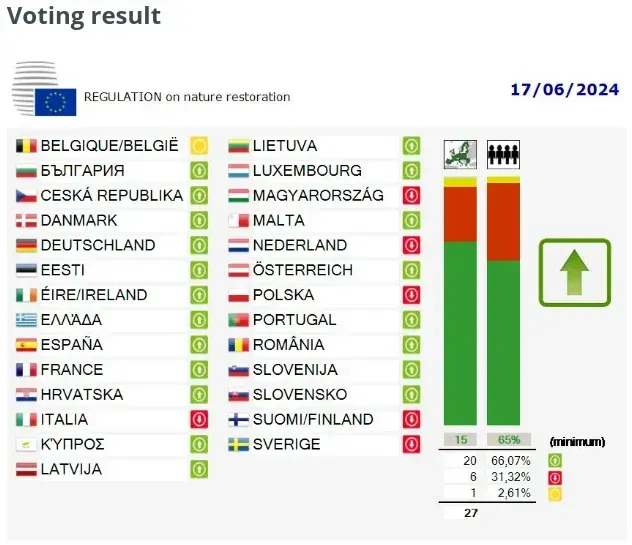Despite Hungarian attempt to thwart it, EU's nature restoration law passed by a narrow margin
The EU's natural restoration law was adopted at a meeting of the Council on Monday. As the Council's statement also points out, this is the first legislation of its kind, aiming to restore a fifth of EU habitats by 2030 and all of them by 2050. It does this by setting legally binding targets for a range of habitat types, setting national recovery plans and by protecting pollinators.
However, the Hungarian state news agency forgot to mention, among other things is that the Council had already held a test vote on the proposal in March, at which time the Hungarian government backtracked and announced its opposition to the text, justifying its position with sovereignty concerns. Without Hungary’s approval, the required majority was not reached.
Euronews had previously learned that the Netherlands, Italy and Sweden said they would vote no, while Austria, Belgium, Finland and Poland said they would abstain (since abstention also counts as a vote cast, it is effectively a polite no). On Sunday, however, Euractiv reported that Austria had switched to a yes vote. In Monday's Council vote, it did indeed agree to the text, to which the representatives of the other countries listed – apart from Belgium, which abstained – including the Hungarian government, said no. Thus, although barely, but the required majority was reached: just over one per cent of the required 65 per cent of the EU population was represented.

The Council had already reached a preliminary political agreement on the text with the other decision-maker, the European Parliament (EP) in November last year. Plenty of disputes surrounded the debates, which was also illustrated by the fact that in June last year the EP just barely managed to adopt its own position, which conservationists claimed was watered down, and it was on the basis of this position that it then negotiated with the Council. Once the two institutions had struck a deal, the text they had compromised on passed through the EP in February relatively smoothly compared to June’s vote. Of the Hungarian parties that voted, only Jobbik rejected the text, while the others, including Fidesz, supported it.
The person responsible for the legislation in the European Parliament had previously told Telex that the Hungarian government's change of position was very surprising. "I expect Hungary to support the legislation in the end, given that even the members of the Hungarian governing party voted for the deal" in the EP, César Luena wrote back in April. The Spanish Socialist MEP said the government's decision to oppose it was "purely for reasons related to the election", even though "the future and well-being of all EU citizens are at stake". He hoped that the Hungarian government would reconsider its position and would "vote in favour of the proposal again".
If the Council had failed to reach a decision at this time, the situation would have had to be resolved during the six months of the Hungarian Council presidency, which will commence in July.
For more quick, accurate and impartial news from and about Hungary, subscribe to the Telex English newsletter!